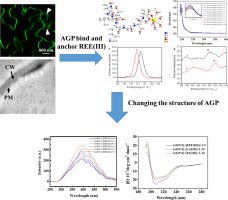Journal of Inorganic Biochemistry ( IF 3.8 ) Pub Date : 2018-02-10 , DOI: 10.1016/j.jinorgbio.2018.01.020 Qing Yang , Lihong Wang , Jingfang He , Zhenbiao Yang , Xiaohua Huang

|
After rare earth elements [REE(III)] are anchored outside of the plasma membrane, REE(III) break plant evolution to initiate leaf cell endocytosis, which finally affects plant growth. However, the molecule for anchoring REE(III) in the acidic environment outside of the plasma membrane is not clear, which is crucial for exploring the mechanism of REE(III) breaking plant evolution. Here, lanthanum(III) [La(III)] and terbium(III) [Tb(III)] were respectively served as a representative of REE(III) without and with f electrons, and Arabidopsis was served as a representative of plants, cellular and molecular basis for arabinogalactan proteins (AGP) anchoring REE(III) outside of the plasma membrane was investigated. By using interdisciplinary methods, when REE(III) initiated leaf cell phagocytosis, we observed the increase in the expression of AGP and their migration to the outside of the plasma membrane. In the acidic environment outside of the plasma membrane, Tb(III) formed more stable Lewis acid-base [REE(III)-AGP] complexes with a higher apparent binding constant (1.51 × 10−6) than La(III) (1.24 × 10−6). In REE(III)-AGP complexes, the bond lengths of REE(III)-O were in normal range and H-bonds were strong H-bonds. The formation of REE(III)-AGP complexes sequentially disturbed the secondary and tertiary structure of AGP, which were enhanced with increasing the concentration of REE(III), and Tb(III) caused stronger structural changes than La(III). Hence, AGP could be molecules for anchoring REE(III) outside of the plasma membrane. The results of this study are direct imaging of how lanthanides break the normal evolution of plants, and can serve as an important guidance for investigating mechanism of lanthanides in organisms.
中文翻译:

镧系元素如何破坏植物正常进化的直接成像
稀土元素[REE(III)]锚定在质膜外后,REE(III)破坏植物进化,启动叶细胞内吞作用,最终影响植物的生长。然而,尚不清楚在质膜外酸性环境中锚定REE(III)的分子,这对于探索REE(III)破坏植物进化的机制至关重要。此处,镧(III)[La(III)]和ter(III)[Tb(III)]分别代表有无电子和有f电子的拟南芥(REE)(III)和拟南芥(Arabidopsis)以植物为代表,研究了锚定质膜外部REE(III)的阿拉伯半乳聚糖蛋白(AGP)的细胞和分子基础。通过使用跨学科的方法,当REE(III)启动叶细胞吞噬作用时,我们观察到AGP表达的增加及其向质膜外部的迁移。在质膜外部的酸性环境中,Tb(III)形成更稳定的路易斯酸碱[REE(III)-AGP]络合物,其表观结合常数(1.51×10 -6)比La(III)(1.24)高×10 -6)。在REE(III)-AGP配合物中,REE(III)-O的键长在正常范围内,H键为强H键。REE(III)-AGP配合物的形成依次扰乱了AGP的二级和三级结构,并随着REE(III)浓度的增加而增强,而Tb(III)引起的结构变化比La(III)更强。因此,AGP可能是将REE(III)锚定在质膜外的分子。这项研究的结果是对镧系元素如何破坏植物正常进化的直接成像,并可作为研究镧系元素在生物中的机制的重要指导。











































 京公网安备 11010802027423号
京公网安备 11010802027423号